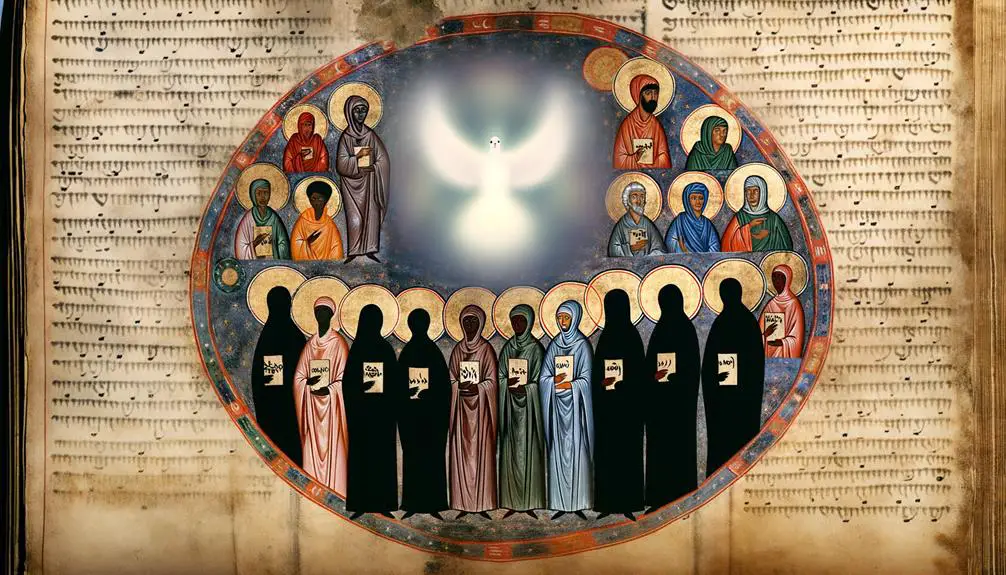Explore the symbolic significance of the number 11 in biblical narratives, uncovering layers of meaning in disorder and transition.

Meaning of 11 in the Bible
When you consider the story of Joseph, you'll notice he was the 11th son of Jacob, introducing a complex narrative of dreams and destiny, which might offer insights into the number's significance in the Bible.
The number 11 often surfaces in contexts suggesting disorder, transition, or judgment, such as the 11 apostles remaining after Judas' betrayal. This pattern invites you to ponder the deeper symbolism of 11 beyond mere coincidence.
By understanding its recurring themes, you'll gain a richer perspective on its role in biblical narratives and what it could signify in the broader spiritual landscape.
Key Takeaways
- The number 11 symbolizes disorder, chaos, and the challenges of transition in the Bible.
- It represents moments of divine judgment and the necessity of trust in God's plan.
- Eleven is linked to significant biblical events, including the story of Joseph and the apostles, highlighting its spiritual significance.
- This number encourages believers to seek divine guidance and embrace spiritual growth during times of uncertainty and change.
The Symbolism of Numbers

In the study of biblical numerology, numbers often carry profound symbolic meanings that reflect divine principles, historical events, or prophetic messages. You delve into the realm of numerical theology to understand how these numbers, such as 11, operate within a framework that intersects with spirituality and divine communication. This analysis sheds light on how numerical values aren't arbitrary but are laden with spiritual significance that stretches beyond the mere quantifiable.
As you explore the concept of angelic numbers, you come to realize that the spiritual world communicates through a numerical language that's both intricate and precise. Angelic numbers serve as messengers, carrying specific vibrations and meanings that are believed to guide, warn, or enlighten. In this context, every number holds a key to unlocking aspects of spiritual wisdom and divine intent.
The analysis of numbers within a biblical context requires a scholarly approach that combines historical, linguistic, and theological insights. This multidisciplinary study allows you to appreciate the depth and breadth of numerical symbolism in the scriptures. By engaging with this complex system, you uncover layers of meaning that contribute to a richer understanding of biblical texts.
Numerical theology, with its focus on angelic numbers, opens a window into the ways the divine communicates and operates within the world. This scholarly inquiry into the symbolism of numbers like 11, beyond its immediate textual appearances, highlights the interconnectedness of all things within a divine order. It's a journey that invites you to look beyond the surface and explore the profound spiritual dimensions encoded within numerical values.
11 in Biblical Stories

You'll find the number 11's significance in biblical narratives is both complex and illuminating.
For instance, Joseph's dreams, which foreshadowed his rise above his brothers, subtly incorporate the number 11, reflecting his position as Jacob's eleventh son and hinting at divine orchestration.
Moreover, Hosea's prophecy, rich in symbolic language, unveils the profound implications of this number in forecasting Israel's future.
Joseph's Dreams Interpretation
Joseph's dreams, pivotal in biblical narratives, reveal profound insights into his destiny and the unfolding divine plan through symbolic imagery. These dreams, marked by remarkable accuracy, serve as a cornerstone for understanding Joseph's eventual ascension to power in Egypt.
Initially, his dreams incite envy among his brothers, foreshadowing the trials Joseph would endure before his prophecies come to fruition. This envy, stemming from Joseph's visions of his family bowing to him, mirrors the intricate dynamics of familial relationships and the complexities of human emotion in the face of predestined greatness.
Analyzing these dreams showcases not only their precision in foretelling Joseph's future but also highlights the pivotal role that envy and sibling rivalry play in setting the stage for Joseph's journey towards fulfilling his destiny.
Jacob's Twelfth Son
Jacob's twelfth son, Benjamin, emerges within biblical narratives as a central figure whose birth and life encapsulate themes of loss, redemption, and the continuation of a divine legacy. His arrival is marked by profound sorrow, as his mother, Rachel, dies in childbirth, yet Benjamin's role in the family and the broader narrative is significant.
As a favored child, similar to his brother Joseph, Benjamin's position within Jacob's family is underscored by the coat significance, a symbol of love and preference. This favoritism, while not as overtly demonstrated as with Joseph, subtly informs his interactions and the dynamics within his family.
His story, interwoven with themes of fraternal relationships and reconciliation, highlights the complexities of inheritance and favor in the biblical context.
Hosea's Prophecy Unveiled
Shifting our focus from the familial narratives of Jacob and his descendants, we encounter the profound insights of Hosea's prophecy, a cornerstone of biblical prophecy that unveils the complexities of divine communication and human response within the scriptural texts.
- Hosea's Marriage: A symbolic act mirroring Israel's unfaithfulness to God, Hosea's marriage to Gomer embodies the themes of betrayal and the potential for redemption.
- Gomer's Redemption: This narrative arc not only personalizes Israel's spiritual adultery but also highlights the possibility of return and forgiveness.
- Israel's Restoration: Hosea's prophecy extends beyond judgment, forecasting a future where Israel is restored, reconciled back to God's favor.
- Divine Compassion: The prophecy underscores God's unwavering love and mercy, demonstrating that even in the face of infidelity, restoration and healing are within reach.
Disorder and Chaos

You'll find that the number 11 in the Bible symbolically associates with instances of disorder and chaos, notably within the Genesis Creation Narrative and the Tower of Babel story.
In the Genesis account, 11 points to the disarray preceding God's structured creation, illustrating a cosmos teetering on the brink of disorder.
Similarly, the Tower of Babel's narrative reflects humanity's chaotic ambition clashing with divine order, underlining the consequences of collective hubris.
Genesis Creation Narrative
In the Genesis creation narrative, disorder and chaos initially dominate the cosmos, setting the stage for a divine intervention that brings order and purpose. This transformation is a meticulous process, unfolding over the Creation week, culminating in Divine rest. The significance of this narrative isn't just historical or theological; it's foundational, offering insights into the nature of divine order versus chaos.
Consider the following elements:
- Formlessness and Void: The earth's initial state, requiring divine action to realize its potential.
- Separation of Elements: Light from darkness, water from sky, land from sea, illustrating the imposition of divine order.
- Creation of Life: The introduction of plants, animals, and humans, signifying the move from barrenness to fecundity.
- Divine Rest: Marks the completion and sanctification of creation, emphasizing a pattern of work and rest.
This narrative invites you to reflect on themes of order, purpose, and rest in your own life.
Tower of Babel
The Tower of Babel narrative unfolds a pivotal moment of human ambition clashing with divine order, resulting in widespread disorder and chaos. This story, deeply embedded in biblical lore, illustrates the consequences of humanity's attempt at cultural integration without divine sanction. By building a tower to reach the heavens, they sought unity and strength, but this act of hubris led to their downfall.
The divine intervention that introduced language diversity wasn't merely a punitive measure but a profound demonstration of the complexities underlying human communication and social organization. This dispersion underscores the challenges of achieving true cultural integration while respecting the inherent diversity among peoples.
Thus, the Tower of Babel serves as a cautionary tale about the limits of human ambition and the importance of diversity in fostering a balanced and harmonious world.
Transition and Judgment

Eleven symbolizes transition and judgment in biblical texts, marking significant shifts and divine decisions. This number often precedes pivotal moments that serve as a bridge to a new chapter, often involving divine intervention or a reevaluation of the path ahead. The notion of eleven as a symbol is deeply intertwined with themes of apostolic mission and spiritual awakening, signifying moments of profound change and reflection.
To better understand the significance of eleven in this context, consider the following points:
- Apostolic Mission: Eleven is closely associated with the period following the ascension of Jesus, a time marked by transition and the preparation for spreading the gospel. This mirrors the broader biblical theme of eleven as a time of preparation and imminent change, laying the groundwork for spiritual awakening and the fulfillment of divine plans.
- Spiritual Awakening: The number often appears at times of judgment and redefinition, suggesting a collective awakening to higher truths and divine guidance. This awakening is both personal and communal, indicating a shift in consciousness and a call to action.
- Divine Judgment: In biblical narrative, the appearance of eleven can signal impending judgment or the culmination of a divine verdict. This judgment can be seen as both a conclusion to past actions and a transition point, offering a chance for redemption and a new path forward.
- Transitional Periods: Throughout the Bible, eleven marks periods of transition, where old structures are dismantled to make way for new beginnings. These transitions are pivotal, often challenging, but ultimately lead to growth and deeper understanding.
The 11 Apostles

Following Jesus' ascension, his disciples, now numbering eleven due to Judas Iscariot's departure, faced the monumental task of spreading the gospel to the corners of the earth, embodying a pivotal moment of transition and divine purpose. This core group, left to navigate without their physical leader, assumed a mantle of spiritual leadership that would echo through the ages, embodying the principles of Apostolic succession. The concept of Apostolic succession underscores the importance of continuity in spiritual leadership, asserting that the authority given to the apostles by Jesus is transmitted through a continuous line of succession.
The eleven apostles, despite their numerical reduction, signify a collective strength and unity in purpose. They were tasked with laying the foundational stones of the early church, a responsibility that required unwavering faith and dedication. This period marks a critical juncture in the history of Christianity, where the apostles' actions and teachings would shape the burgeoning faith and its spread across diverse cultures and regions.
Apostle |
Key Contribution |
Symbol of Leadership |
|---|---|---|
Peter |
Rock of the Church |
Keys |
John |
Theologian and Visionary |
Eagle |
James |
First Martyr |
Scallop Shell |
Andrew |
Missionary Zeal |
X-shaped Cross |
These individuals, each with their unique traits and contributions, exemplify the essence of spiritual leadership. Their lives and legacies serve as a testament to the enduring power of faith and the responsibility of carrying forth a divine mission, principles that remain at the heart of Apostolic succession.
11th-Hour Moments

In biblical narratives, 'eleventh-hour' moments often underscore a period of unexpected grace or divine intervention, marking pivotal instances where outcomes hinge on faith and divine timing. These instances aren't only thrilling but they deeply illustrate the intricacies of faith's role in divine plans and the miraculous emergence of unexpected outcomes from seemingly dire situations.
To understand the depth and significance of these moments, consider the following:
- The Power of Faith: In these narratives, the protagonists often face insurmountable odds. Yet, it's their unwavering faith, even in the eleventh-hour, that acts as a catalyst for divine intervention. This teaches us the importance of maintaining faith, especially when faced with last-minute decisions that seem to defy logical outcomes.
- Divine Timing: The timing of these interventions highlights a key aspect of divine interaction with humanity. It suggests that divine timing often waits until the eleventh-hour to reveal itself, emphasizing that what may appear as last-minute decisions to humans are, in fact, perfectly timed in the divine calendar.
- Unexpected Grace: The eleventh-hour moments are a testament to the concept of grace—unearned, unexpected, and often coming when all hope seems lost. This grace transforms situations, leading to outcomes that were previously unthinkable.
- The Role of Divine Intervention: These narratives underscore the active participation of the divine in human affairs, especially in moments of critical decisions. It's a powerful reminder that even in the brink of despair, divine intervention can steer outcomes towards unexpected and favorable directions.
Analyzing these eleventh-hour moments in biblical texts reveals a complex interplay between faith, divine timing, and unexpected outcomes, offering profound insights into the nature of divine intervention and the power of last-minute decisions in shaping human destiny.
Prophecy and Revelation

While exploring the concept of eleventh-hour moments reveals the dynamics of faith and divine intervention, understanding prophecy and revelation in the Bible offers a deeper insight into the mechanisms of divine communication and its implications for humanity. Prophecy and revelation serve as a bridge between the divine and the mortal, particularly concerning end times and visionary symbols. These elements are crucial for interpreting the signs and messages that have been foretold.
In the biblical context, prophecy doesn't just predict future events; it also serves to communicate God's will and provide guidance to humanity. Revelation, on the other hand, unveils the previously unknown, often concerning the ultimate fate of the world and the fulfillment of God's plan for humanity. The number 11, with its association with judgment, transition, and revelation, intensifies these themes.
Aspect |
Significance |
Biblical Reference |
|---|---|---|
Visionary Symbols |
Serve as metaphors for deeper spiritual truths |
Daniel 7:24 |
End Times |
Indicate the culmination of God's plan |
Revelation 20:12 |
Divine Communication |
Facilitates a connection between God and humanity |
Amos 3:7 |
Human Response |
Reflects obedience, disbelief, or misunderstanding |
Jonah 3:5 |
This table illustrates the multifaceted nature of prophecy and revelation, emphasizing their role in conveying complex spiritual messages through symbolic language. Understanding these concepts requires a discerning mind and a heart open to divine wisdom, as the messages are often veiled in metaphor and require interpretation through a spiritual lens.
Reflections for Believers

Reflecting on the number 11's biblical significance reveals its profound implications for believers, particularly in understanding God's complex messages of prophecy and revelation. This number, often considered a symbol of transition or spiritual awakening, can serve as a reminder of the importance of seeking divine guidance and fostering spiritual growth in one's life.
Here are four key reflections for believers:
- Embrace Transition: The number 11 signifies moments of transition and change. For believers, this can mean being open to divine guidance during times of uncertainty. Trusting in God's plan, even when the path forward isn't clear, is a crucial aspect of spiritual growth.
- Seek Understanding in Prophecy: The association of 11 with prophecy in the Bible encourages believers to delve deeper into the study of God's Word. Understanding the prophetic messages contained within the Scriptures can provide insight into God's character and His plans for humanity.
- Acknowledge the Role of Revelation: Revelation, often linked with the number 11, invites believers to seek personal revelations through prayer and meditation. These moments of divine insight can strengthen one's faith and offer guidance in difficult decisions.
- Pursue Spiritual Growth: Lastly, the symbolic meaning of 11 points to the importance of continuous spiritual development. Engaging with the Bible, participating in community worship, and committing to personal prayer time are all essential practices that foster a deeper relationship with God.
For believers, the number 11 serves as a powerful reminder of the need for divine guidance and the value of spiritual growth in navigating life's challenges.
Frequently Asked Questions
How Do Non-Christian Cultures and Religions Interpret the Number 11, and Does It Have Similar or Contrasting Meanings?
In non-Christian cultures and religions, the number 11 often carries diverse meanings, distinct from biblical interpretations. Through numerology practices, it's frequently associated with spiritual awakening and intuition.
In some cultures, it's linked to cultural festivals, symbolizing renewal and unity. These interpretations contrast with Christian symbolism, offering a rich tapestry of beliefs. Analyzing these differences provides insight into how numbers like 11 hold universal yet varied significance across cultural landscapes.
Are There Any Scientific Theories or Psychological Studies That Give Special Significance to the Number 11 Apart From Religious or Cultural Beliefs?
Yes, there are scientific theories and psychological studies that explore the significance of the number 11 beyond religious or cultural contexts. Through numerological analysis, researchers delve into patterns and meanings attributed to numbers, including 11.
Cognitive biases also play a role, where people might assign special significance to 11 based on personal or collective experiences. These approaches offer a more analytical and scholarly perspective, examining how our minds interpret numbers like 11 in various contexts.
How Has the Number 11 Been Represented or Utilized in Major World Events, and What Impact Has It Had on Public Perception or Historical Outcomes?
You've noticed the 11:11 phenomenon and Numerology trends have woven 11 into major world events, shaping public perception and historical narratives. This number's frequent appearances and its role in events like 9/11 have intensified its mystique, influencing both collective consciousness and individual beliefs.
Its utilization in these contexts reflects a deeper, perhaps unconscious, resonance with 11's symbolic significance, altering how events are interpreted and remembered in a way that's both subtle and profound.
Can the Number 11 Be Linked to Specific Architectural or Artistic Expressions Throughout History, and How Have These Interpretations Influenced Contemporary Design or Art?
Certainly, you can find the number 11 influencing various architectural and artistic expressions throughout history. Its presence often brings a unique form of numerical harmony and geometric patterns into designs, impacting contemporary art and architecture significantly.
In Modern Times, How Has the Number 11 Been Adopted or Represented in Digital Technology, Coding, or Internet Culture, and What Implications Does This Have for Its Symbolic Meaning?
You've likely noticed how digital superstitions and binary patterns shape our online world. Specifically, the number 11 pops up intriguingly in coding and internet culture, signaling a shift from mere digits to a symbol of technological novelty.
It's not just about the numbers; it's how they're woven into the digital fabric, influencing design and user experience. This adoption underscores a fascinating blend of ancient symbolism and modern digital expression, redefining its cultural significance.
Conclusion
In conclusion, the number 11 in the Bible serves as a multifaceted symbol, embodying themes of disorder, transition, and divine revelation. Through the lens of biblical stories, it's evident that 11 isn't merely a number but a beacon of deeper spiritual truths.
As you reflect on its significance, consider how moments of chaos and transition in your own life might also be gateways to understanding and growth. In the tapestry of scripture, every thread, no matter how seemingly inconsequential, weaves into the larger story of faith and redemption.



Sign up